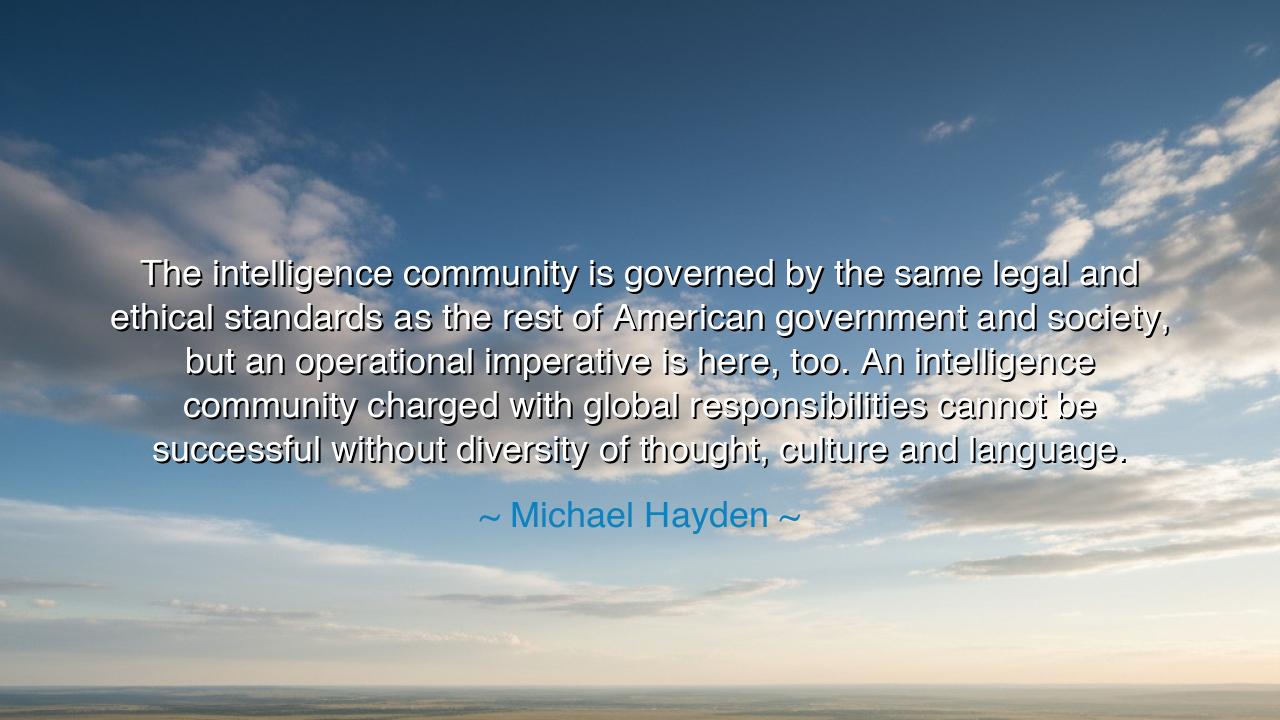
The intelligence community is governed by the same legal and
The intelligence community is governed by the same legal and ethical standards as the rest of American government and society, but an operational imperative is here, too. An intelligence community charged with global responsibilities cannot be successful without diversity of thought, culture and language.






Hearken to the words of Michael Hayden, who once bore the burden of guarding his nation from unseen perils: “The intelligence community is governed by the same legal and ethical standards as the rest of American government and society, but an operational imperative is here, too. An intelligence community charged with global responsibilities cannot be successful without diversity of thought, culture and language.” These words are not only a declaration of principle but also a beacon that points to the soul of security itself. For in the struggle against the shadows, knowledge is the weapon, and knowledge cannot flourish where minds are narrow and voices are few.
When Hayden speaks of legal and ethical standards, he reminds us that even the watchmen of nations are not above the laws of the land. Their power is great, their reach vast, but they remain bound to the same moral fabric that governs all society. To forget this is to fall into tyranny, for unchecked guardians may themselves become a threat. Yet Hayden goes further, declaring that beyond the law there is an operational imperative—a necessity born not of ideals alone, but of survival itself. The intelligence community cannot merely wish for diversity; it must have it, for without it, it is blind.
Consider the nature of diversity of thought, culture, and language. The world is a tapestry woven with many colors, many customs, many tongues. No single vision, no single culture, no single language can comprehend the whole. To understand the whisper of an adversary, the nuance of a foreign alliance, or the silent weight of a people’s grievances, one must look through many eyes and listen with many ears. Diversity, then, is not a token, nor a courtesy, but the very lifeblood of global responsibility.
History itself provides the lesson. Recall the story of the Navajo Code Talkers of World War II. In the great clash against tyranny, when enemies sought to unravel every secret code, the United States turned to the voices of its Indigenous sons. Using their ancient language—unknown to foreign ears—they created a cipher unbroken by the enemy. Their contribution, born of cultural uniqueness, saved countless lives and turned the tide of battle. This was the power of diversity, not as ornament, but as the sharp edge of victory.
Hayden’s words echo with the truth that in the modern age, the battles are fought not only with weapons but with understanding. To know the culture of a distant land, to speak its language, to grasp the weight of its traditions—this is as vital as any army. A failure of diversity is a failure of vision, and a failure of vision can bring ruin upon a people. Thus, the call for inclusiveness is not merely for justice’s sake but for the sake of survival and triumph.
The teaching here is clear: unity in difference is strength. A chorus of many voices sings more richly than the monotone of one. Just as an orchestra requires many instruments to bring forth harmony, so too must a nation’s protectors embody many perspectives to fulfill their duty. To exclude difference is to diminish capacity; to embrace it is to open doors of wisdom no single mind could unlock.
Children of tomorrow, take this wisdom into your hearts: seek always the voices of others, especially those unlike your own. In your schools, your workplaces, your communities, do not fear the unfamiliar tongue or the foreign custom. Instead, learn from them, and let them expand your vision. The strength of a people is not in uniformity but in the shared weaving of many threads.
And so let the lesson be lived: pursue diversity not as a burden but as a source of resilience; honor the ethical standards that guard against corruption; and remember that to understand the world, one must walk among its many peoples. In doing so, you will not only strengthen your own spirit but also help build a society capable of meeting the responsibilities of a global age with wisdom, justice, and enduring strength.






AAdministratorAdministrator
Welcome, honored guests. Please leave a comment, we will respond soon